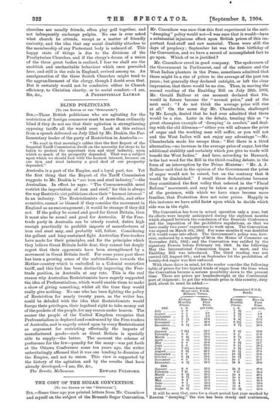BLIND POLITICIANS.
[To THE EDITOR OF THE "SPECTATOR." _I Six,—Those British politicians who are agitating for the restriction of foreign commerce must be more than ordinarily blind if they do not see that their agitation is strengthening opposing tariffs all the world over. Look at this extract from a speech delivered on July 22nd by Mr. Deakin, the Par- liamentary leader of the party of Restriction in Australia :— . " He read in that morning's cables that the first Report of the Imperial Tariff Commission dwelt on the necessity for steps to be taken to protect the important iron and steel industry, upon which so much of its prosperity depended. That was a subject upon which we should look with the keenest interest, because on our iron and steel industry a good deal of our prosperity depended."
Australia is a part of the Empire, and a loyal part, too. Yet the first thing that the Report of the Tariff Commission suggests to Mr. Deakin is "our iron and steel industry,"—the Australian. In effect he says "The Commonwealth must restrict the importation of iron and steel," for this is always the way Restricticaist politicians show their "keenest interest" in an industry. The Restrictionists of Australia, and other countries, cannot be blamed if they consider the movement in England as an encouragement; it would be strange if they did not. If the policy be sound and good for Great Britain, then it must also be sound and good for Australia. If the Free- trade party in Australia can be utterly routed, duties high enough practically to prohibit imports of manufactures of iron and steel may, and probably will, follow. Considering the gallant and long-sustained fight Australian Free-traders have made for their principles, and for the principles which they believe Great Britain holds dear, they cannot but deeply regret that their opponents have been strengthened by a movement in Great Britain itself. For some years past there has been a growing sense of the unfriendliness towards the Mother-country which is embodied in a Colonial restrictive tariff, and this fact has been distinctly improving the Free- trade position, in Australia at any rate. This is the real reason why Australian Restrictionists have eagerly supported the idea of Preferentialism, which would enable them to make a show of giving something, whilst all the time they would really give nothing. No one who has been fighting the policy of Restriction for nearly twenty years, as the writer has, could be deluded with the idea that Restrictionists would forego their privileges, their legalised right to take money out of the pockets of the people, for any reason under heaven. The sooner the people of the United Kingdom recognise that Preferentialism is deplored and condemned by the Free-traders of Australia, and is eagerly seized upon by every Restrictionist as argument for restricting effectually the imports of manufactured goods—such as Great Britain is specially able to supply—the better. The moment the scheme of preference for the few—penalty for the many—was put forth at the Ottawa Conference some ten years ago, the writer unhesitatingly affirmed that it was one tending to disunion of the Empire, and not to union. This view is supported by the history of the agitation and by the results that have already developed.—I am, Sir, &c.,






































 Previous page
Previous page